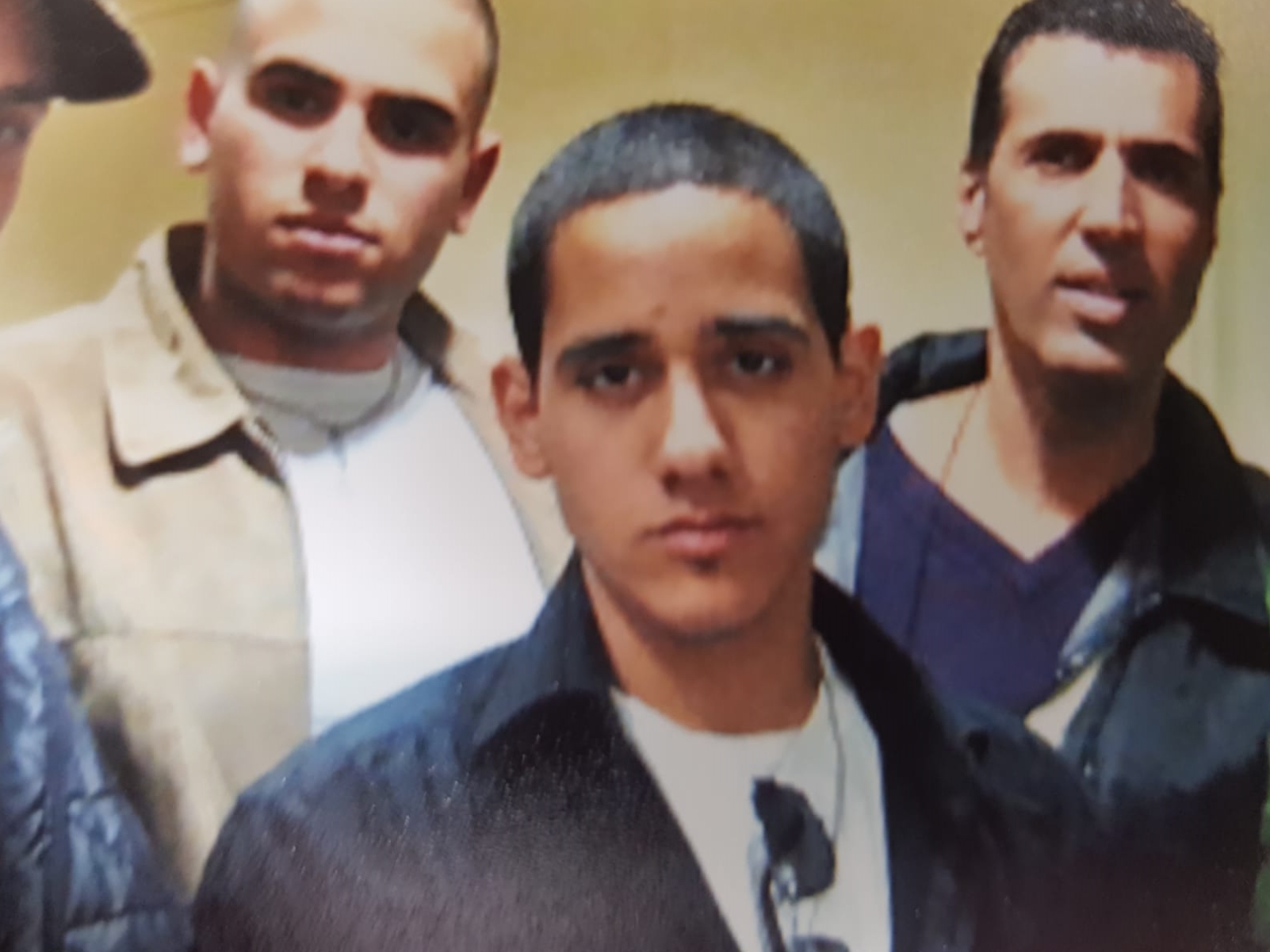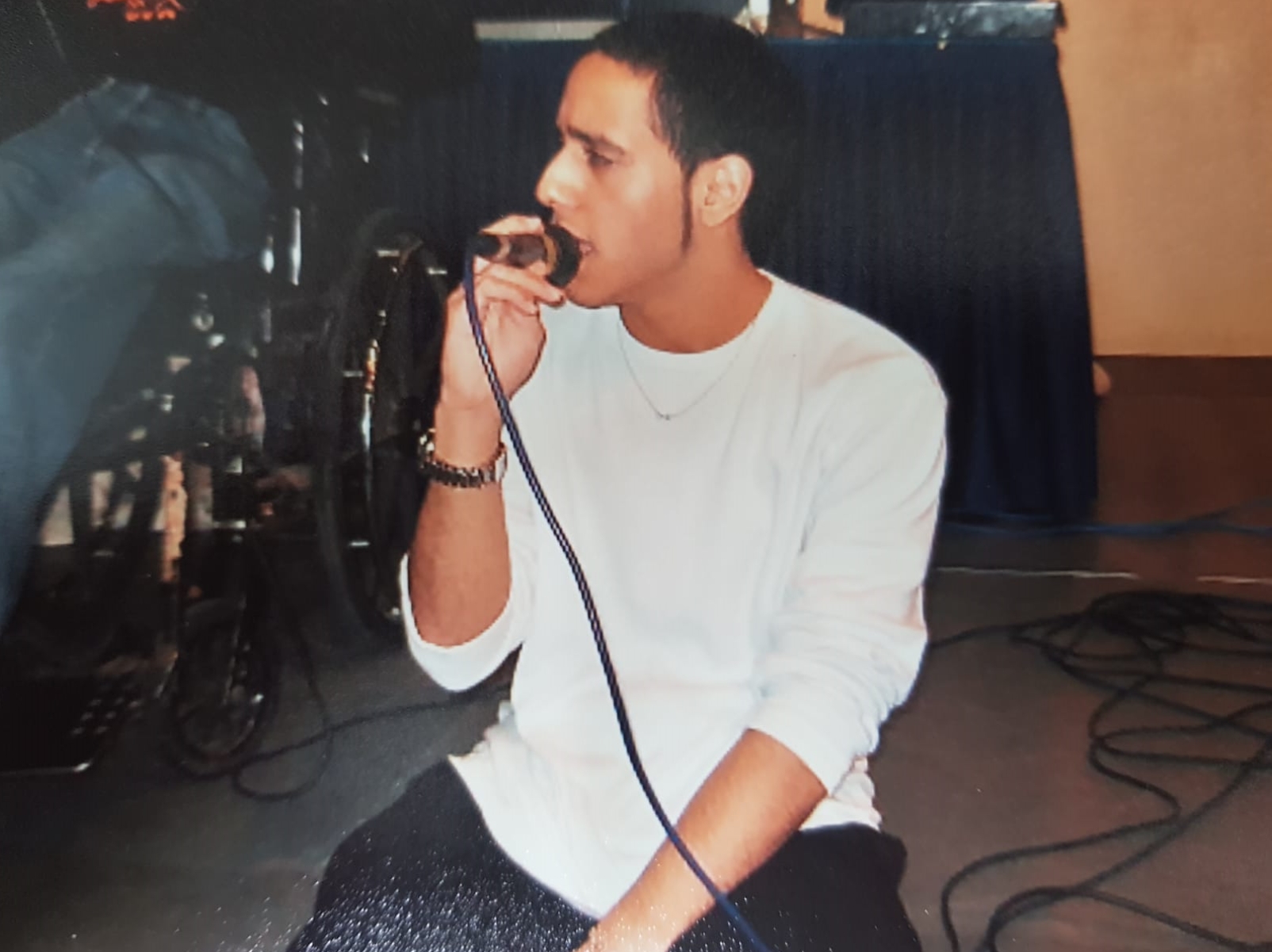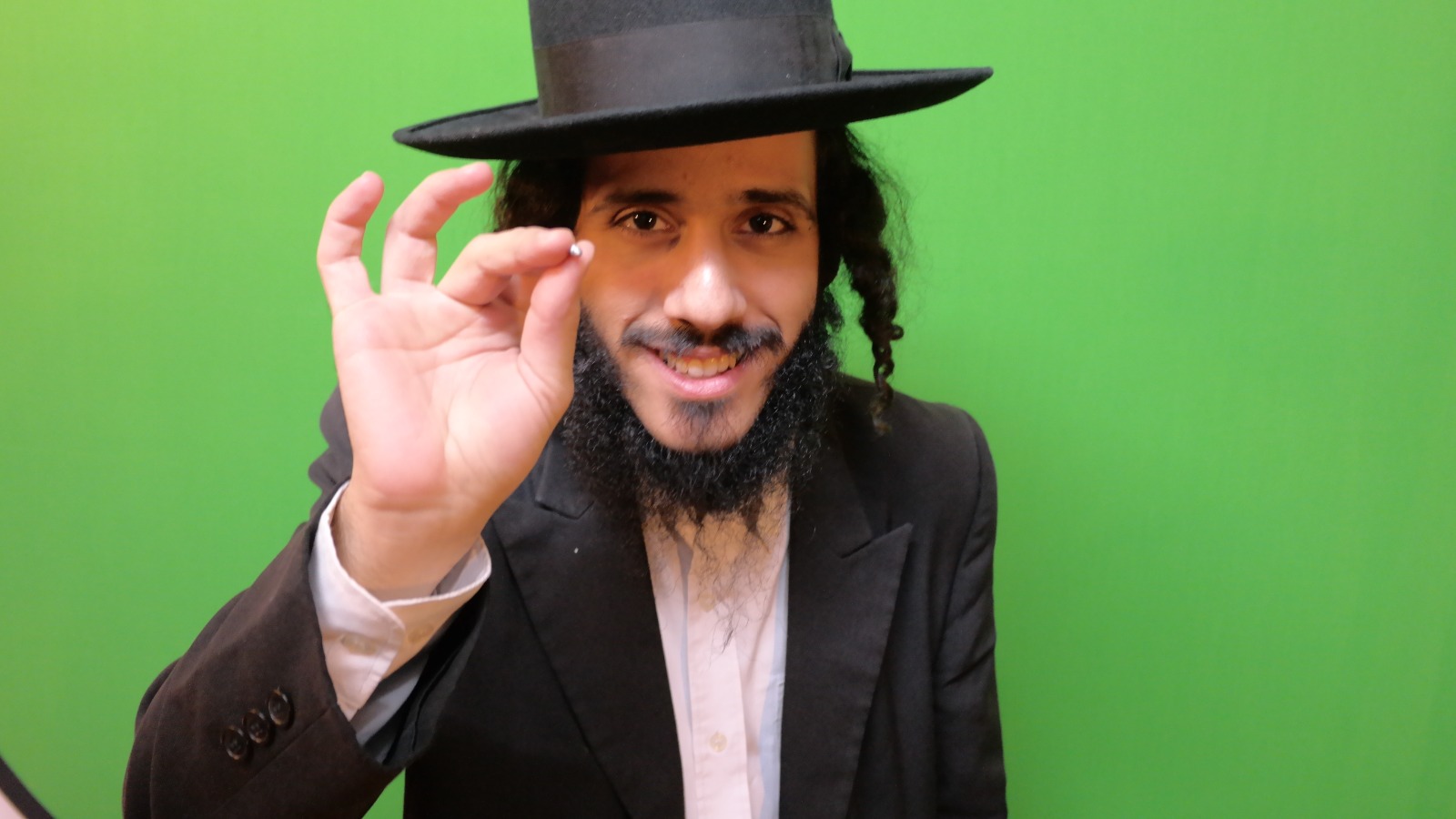"Performing in Clubs in Tel Aviv, I Never Thought One Day I'd Edit Rabbi Arush's Books"
From prestigious radio programs to performing with top Israeli rappers and working as a reporter at Channel 10, none of these were enough for Yair Elitzur, who eventually found his happiness in leading a Torah-observant life. Now, after a decade in yeshiva, he's returning to create - but this time with holiness.
 Yair Elitzur today
Yair Elitzur today"Look at this, how Hashem turns the world," Yair Elitzur said toward the end of our chat. "A person thinks they're in a certain place, and then – Hashem moves them somewhere else. Sometimes a single phone call can change a person's life."
Our conversation, taking place in Elitzur's modest office at the 'Chut Shel Chesed' yeshiva in Jerusalem - is as pleasant as the room we sit in. The view through the window, with its mix of worlds and styles, seems similar to what constantly goes on inside Elitzur.
"From a young age I've been into music," he says with a spark of nostalgia in his eyes. "Writing, composing, singing, producing, broadcasting. Everything. But after returning to religion, I didn't touch it for almost ten years. The change was so extreme that music didn't interest me at all. I immersed myself in serving Hashem, and of course, focusing on my family. The creative urge completely left me. Then, one day, a few years ago, I got a call from an old friend. We caught up and then he said, 'Go back to making music. I'll arrange a studio for you at no cost, musicians, everything. Just come. Get your things together and show up.'"
 Yair Elitzur in his youth
Yair Elitzur in his youth"I had no idea what to do, or more accurately – I just wasn't in that place. Nonetheless, I went to consult with Rabbi Shalom Arush, the head of 'Chut Shel Chesed' yeshiva. I told the rabbi that I didn't want to be famous, that I had distanced myself from that world, etc. The rabbi listened patiently and then said I must pursue it. It's more important than anything, even prayer and Torah study. I told him: 'Rabbi, you want me to reach out to many people? No problem. I'll distribute pamphlets, books, I'll go door to door. I'll do whatever the rabbi says.'"
"The rabbi, attentive yet firm, reiterated, saying I should record new material. Songs that bring people closer to Hashem. Eventually, it became clear the friend was merely a heavenly messenger to awaken me to this task. I gave a positive reply, but he soon disappeared. Still, because the rabbi stressed its importance, I secured a small sum and recorded an album. With Hashem's help, 13 songs emerged and did a great deal of good in the world. I've heard of amazing things that happened because of these songs."
Interesting, share with us.
"Some time ago a person stopped me on the street. He looked like a classic Orthodox Jew. He said he loved the songs and shared that a few years back he traveled to India intending to cast off all burdens. Somehow my songs reached him in the Himalayas, and they strengthened him a lot. Shortly after, he packed his things, returned to Hashem and to the land. Beyond that, a woman once told me she had decided to leave Judaism, to live like a non-Jew, had already started moving in that direction, but because of my songs, she decided to remain religious."
A Secular Disguise
Yair Elitzur, 30, married and a father of four daughters, resides in Jerusalem. A musician, studying at 'Chut Shel Chesed' yeshiva, he holds various administrative roles within the yeshiva and is also part of the team editing Rabbi Arush's books. "I was born to a religious-Zionist family from Rehovot," he says. "My parents are Persian. Our home had tradition plus, but not much beyond that. My mother didn't cover her head, and there was a TV at home. I attended a religious high school but did things that secular people didn't. I was a secular person in disguise. I kept Shabbat more or less, but I had no faith. I think it was easier to keep Shabbat in those years because 15 years ago the internet and cell phones weren't as rampant as today."
"Years went by, and when I was in the army, it seemed like I had it all. I had a personal radio program broadcasted in the central area and belonged to Reshet Bet, I performed with the biggest rap artists in the country with my original material, and I was a video reporter for the 'Nana 10' website, which was very strong. On top of that, I also got a dream military position at the Kirya in central Tel Aviv. Despite all this, and I will never forget it, I was so distressed that I simply couldn't sleep at night."

What troubled you so much?
"On the surface, I had everything, but in essence, I had nothing. I could see it wasn't the real thing. I saw that there was no genuine enthusiasm. That I couldn't build a life with it. I had lots of friends, but I realized I didn't have any real friendships. That you couldn't rely on anyone. That the world is unfriendly. I had many anxieties. I was very nervous. Constantly thinking about what would happen, whether I'd succeed, not succeed. Now, by the way, this hardly exists at all. Now that I know there's Hashem in the world, I know He'll do the best for me. Just recently, for example, I started a crowdfunding campaign. It failed, but it doesn't bother me. I know everything is for the best from Hashem, blessed be He."
I find it hard to believe you took it completely in stride.
"It's the truth. I wasn't even a little upset. Had it happened before I returned to religion – I wouldn't have gotten over it for months. In general, living secularly has many problems. While there were fun aspects to being secular in several narrow and temporary ways, I constantly felt a general sense of disappointment. Lack of satisfaction. A lack of self-fulfillment. A realization that there's nowhere to truly aspire to. I felt the secular lifestyle had collapsed. It had nothing to offer."
"In those days," Elitzur continues, "I met many famous people. A large part of them told me their lives were a mess. And I told myself I didn't want to be like them. I tried to think about where I wanted to get to. Occasionally, when I went to synagogue and someone spoke to me about words of Torah, I tasted the essence of heaven. I understood that I was in hell - and there were people in heaven. Slowly, I understood how this works. I realized that those who act like a bad child towards Hashem - get slapped, and those who act as good children benefit. Without Hashem, even if you supposedly succeed and earn money, the soul isn't healed. Go to a good restaurant, a pricey hotel, and then what?"
"In this context of achieving true happiness, Rabbi Arush often tells us that the only way to be truly happy is through maintaining a good connection with Hashem. When someone is bonded with Hashem, they enjoy this world. It's not easy because everyone faces temptations, but we need to pray for it. Talk to Hashem about it. Say: 'Father, help me get closer to you. Help me overcome my desires that distance me from you.' You can even sing about closeness to Hashem. Like a deer for streams of water so my soul longs for you, G-d. My soul craved under your shadow to know every secret mystery of yours. And more sweet songs, there are plenty, thank G-d."
"Beyond that, it's crucial to realize that a person can't achieve all their desires. Money, women, honor, etc. Therefore, if one tries to achieve them - they'll always remain frustrated. But when a person pursues Hashem - Hashem opens up and draws them closer. In this constant effort, one can get closer to Hashem more and more - and attain true happiness."
A Surprising Match Proposal
After tough feelings overwhelmed him during the day and nagging thoughts robbed him of sleep at night, Elitzur, in his words, began searching for the true point in his life. A process complicated by the fact that, materially speaking, he had reached enviable peaks. "In those days," says Elitzur, "I served as the chief aide to a lieutenant colonel at the Kirya, at the heart of Tel Aviv. Towards the end of my service, after I strengthened my faith, they moved me to assist the rabbi of Tel Hashomer, but I was still at the Kirya."
"Moreover, musically, I was at my peak. I created a lot and performed with considered and recognized artists. Everyone significant then in the rap scene."

"Moreover, from time to time I studied Torah and saw it enlivened my spirit. Rabbi Arush's book, 'In the Garden of Emuna', reached me, and because of the things I studied in it – I started praying more and more to Hashem. Simply talking to Him. Within a brief period, I saw that Hashem was simply giving me what I was asking for, miraculously guiding me. It was so profound that I felt it wasn't pleasant to be ungrateful and cause Him trouble. I mean, not keeping mitzvot. I told myself - if Hashem is so good to me, and helps me so much, why should I be bad to Him?"
So, what did you do?
"I started studying more and more, and applying as much as I could what I learned. I started to try to refrain from physical contact, to guard my eyes, and generally to avoid committing sins. It took a lot of time, but it happened. Shortly afterward I put on a cap so people wouldn't see I had a kippah, and began growing a beard. In the first few months, I continued working in what I was doing, but from a different standpoint. I also thought a lot about how to save myself from sins, so I refused some things I was asked to do, and at the same time, I thought about how I could positively impact. For instance, in this context, when people would gossip on my radio program - I tried to change the subject."
"A few months later, I was discharged, and I told myself that if there's Hashem in the world, as I discovered, then I want to follow this to the end. I reached 'Chut Shel Chesed' yeshiva and began studying there. Naturally, when they saw in the yeshiva that I was in a serious process, they thought I should meet someone for matchmaking purposes. And indeed, one day Rabbi Shalom called me and suggested I meet the woman who would later become my wife. We met five times and decided to marry."
"I continued studying in the yeshiva, and after a few years, they offered me to help in editing the books that the yeshiva produces. When I used to perform in clubs in Tel Aviv, I couldn’t have imagined that one day I’d be editing Rabbi Arush’s books. But life holds surprises, and here I am, once again involved in music, along with everything else I do. After the first album, I already saw that the songs do a lot of good for people, and I'm trying to continue down this path. There are people who love my songs and are inspired by them, but they don’t know that although I work and support my family, I can’t fund the release of an album alone, especially not at the high quality that I think is warranted. I hope a way will be found to secure the budget, with the help of dedicated emissaries to the place, and with G-d’s help, I can fulfill one of the main purposes of my life. Music has enormous power, and there’s still so much to do."

